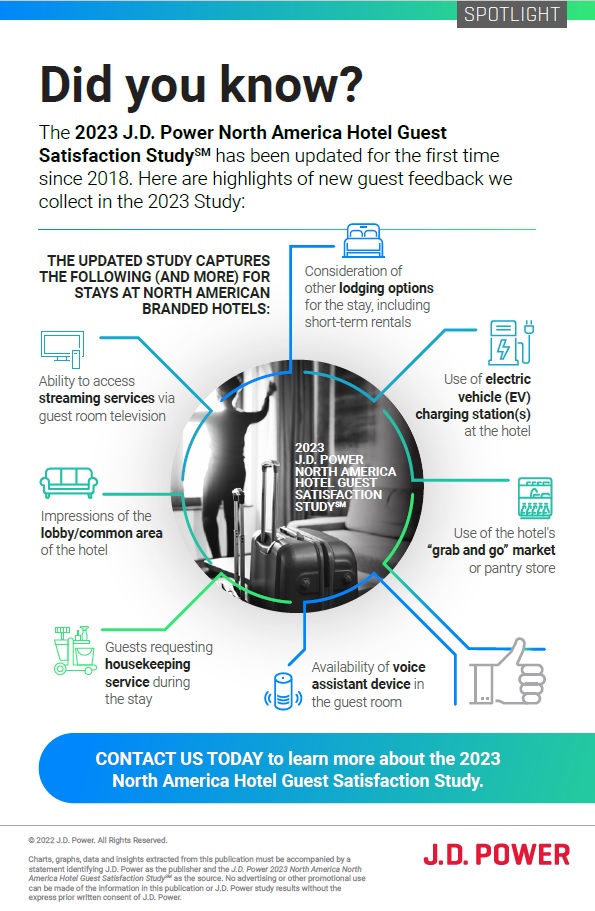Navigating 2023 : How Hotels Continue to Adapt to Changing Guest Preferences


Synopsis
Andrea Stokes at J.D. Power writes that the hotel and travel industry experienced a surprising year in 2022, with a surge in leisure demand and high room rates due to consumers booking "revenge" travel after two years of the pandemic. The labor shortage in hospitality will continue to ease, but the industry needs to work on educating the younger generation about careers in hospitality and improving their software training. Hotel technology still has a long way to go, with many franchisees and independent hotel owners avoiding software updates and sticking to legacy systems. 2023 is set to be "The Year of Sustainability" with hoteliers having the opportunity to make their properties more environmentally friendly, and guests becoming increasingly interested in sustainability programs. With the waning effects of the pandemic and a brighter future, the hotel industry will continue to grow with job creation, resuming property improvements and capital investments, and providing returns for real estate owners.
Were you surprised at how last year played out for the hotel industry and the travel industry overall? In January each year on the J.D. Power Travel & Hospitality podcast, we make predictions about the year ahead. I recall our predictions in January 2022—the continued pandemic would depress (or eliminate all together) international inbound travel demand, luxury-oriented demand would push up leisure room rates, there would be continued softness in transient business travel but green shoots of recovery for group/MICE business travel.
While our predictions were largely correct, we underestimated leisure demand and how high hotel room rates would soar in 2022. While room rates had been rising by the end of 2021, we were experiencing another Covid surge at that time. No one knew how long the surge would continue; thus, it was difficult to predict how the high seasons (spring and summer) would play out. Yet if I were to sum up 2022 in one word, it would be “revenge”. Consumers were booking “revenge” travel after two grueling years of a pandemic, and hotel operators were raising room rates as “revenge” against to two years of ugly property P&Ls. So, what should we in the industry expect in 2023?
First, the labor shortage in hospitality will continue to abate this year; although there remains a longer-term imperative to educate Generation Z about careers in hospitality. Larger hotel operators need to begin working directly with more degree-granting colleges – especially community colleges – that offer hospitality programs. Students benefit from real-world experience gained working at hotels, and operators benefit from young talent eager to learn.
Hospitality education programs also need to up their certification game when it comes to hospitality software. Just as in other industries, training in relevant software programs greatly improves students’ chances of being hired. But it is a two-way street, and software providers could do a better job of partnering with colleges to certify students in the most common PMS, revenue management, and event management tools.

Speaking of hotel technology, the industry still has a long way to go. Unfortunately, many small franchisees and multi-property operators continue to put off updating or replacing outdated technology. They view software updates as simply another cost to be avoided, without considering the higher cost of hanging on to legacy software and systems.
Will the industry move the needle in 2023? As many independent hotel owners are still trying to recover from pandemic-related losses, it will be several years until Web 3.0, 5G, IOT, the Metaverse, and competition from more modernized hotels will force a reckoning. In the meantime, the large global franchisors will keep innovating toward a higher level of personalization for guests.
If 2023 will be “The Year of…” anything in the industry, it will be “The Year of Sustainability”. Hoteliers have the best opportunities yet to make their properties more energy efficient, reduce the use of plastics, support electric vehicle adoption, and encourage environmentally-conscious behavior in their guests. Indeed, the J.D. Power Hotel Guest Satisfaction Study finds that the proportion of guests saying hotel sustainability programs are a “need-to-have” feature (as opposed to “nice-to-have”) has grown from 12% in 2019 to 17% today.
The Study also shows that during the stay, 5% of guests used the hotel’s EV charging station to charge an electric vehicle. While this number is small for now, the market of EV-owning hotel guests will grow as more consumers purchase electric vehicles. In addition, the reduction in daily housekeeping (due to pandemic safety and reduced staff) is also contributing to lower usage of chemicals and water. Reduced housekeeping is here to stay, as the J.D. Power Study indicates that most of American and Canadian hotel guests (74%) stay less than 4 nights, yet less than half of these guests (39%) say they need to have daily housekeeping.
With the waning effects of the pandemic, the fog is clearing, and the future is brighter for the hotel industry. The industry continues to add both jobs and workers, and hotel owners and operators are starting to resume routine property improvements and larger capital investments. Hotel real estate is still providing owners with returns that fuel additional purchases and new builds.
Franchisees continue to benefit from brand agreements with the large chains, which in return provide standards-driven platforms and options to help lower operating expenses. While higher room rates are currently dampening overall guest satisfaction and perceptions of value for money, additional staff and property improvements will start to positively impact the guest experience. Continued inflation in many countries will soften leisure travel demand this year compared to the highs of 2022, but most in the industry expect the high travel season to match last year’s gains. Make no mistake – the industry still has work ahead of it, but we have entered new era of technological innovation, workforce efficiency, and a changed consumer mindset. This combination is sure to drive business success for hoteliers and a much-improved experience for their guests.